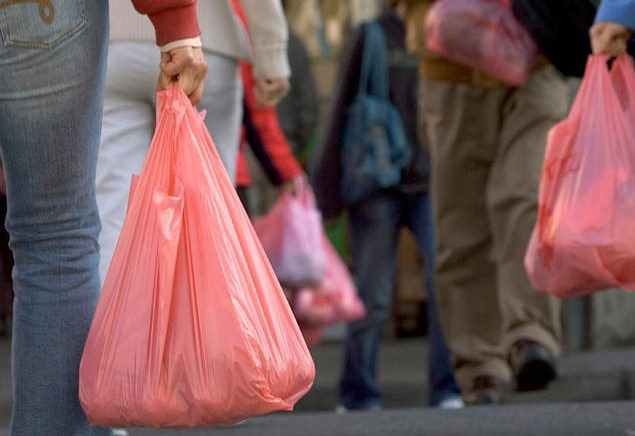http://e-info.org.tw/node/117437
課稅減量見成效 英格蘭一年少60億個塑膠袋
文字大小
288 1 Share1
本報2016年8月2日綜合外電報導,姜唯編譯;蔡麗伶審校
為減少垃圾和保護野生動物,英格蘭去年10月起實施每個免洗塑膠購物袋課稅5便士(約新台幣2元),六個月後用量減少85%以上。
英格蘭是英國最後一個實施塑膠袋課稅的地區。圖片來源:Day Donaldson(CC BY 2.0)。
塑膠袋不再免費拿 一定規模零售業者須繳稅
根據英國環境糧食與偏鄉事務部(Department for Environment, Food and Rural Affairs,Defra)的首次成效評估,課稅前,英格蘭超市每年共給出超過70億個塑膠袋,但課稅後的第一個半年,總數卻只有5億個,全年預計將減少60億個塑膠袋,顯示此措施相當有效。
英格蘭是英國最後一個實施塑膠袋課稅的地區,較早實施的蘇格蘭、威爾斯和北愛爾蘭都相當成功。
2014年,英格蘭七大超市免費提供的塑膠袋數量超過76億個,等於平均每人拿140個,總重高達6萬1000噸。因此政府推出塑膠袋收費措施,希望影響消費者的行為。
正職員工250人以上的零售業者,每提供一個塑膠袋必須收取最少5便士的費用,但規模較小的零售業以及紙袋不在此限。部分食物商品如生肉和魚、處方藥、種籽、花和活魚也仍可使用免費塑膠袋。
塑膠袋課稅上路時,英政府預測將能減少超市一次性塑膠袋達80%、商業街一次性塑膠袋達50%,同時省下6000萬英鎊的垃圾清潔費。
下一步挑戰:免洗咖啡杯、塑膠飲料罐
Defra指出,這項措施也引發了一波慈善捐款潮,零售業共捐出超過2900萬英鎊(約新台幣12億元)給慈善組織和社區團體。英國最大零售業者特易購(Tesco)執行長戴維斯(Matt Davies)就表示支持:「這項措施讓英格蘭顧客每週少用300萬個塑膠袋,是環境一大福音。」
據估計,每年有800萬噸塑膠進入海洋,嚴重威脅海洋生態。專家估計,31種海洋哺乳動物和超過100種海鳥會吃下塑膠垃圾。
塑膠袋需要花數百年時間才能分解,但現在,塑膠飲料罐和免洗咖啡杯也成為環境保護的挑戰。
海洋保育協會(Conservation Society)2015年的年度淨灘統計資料顯示,英國海岸的垃圾量比前一年上升1/3。塑膠飲料罐數量比2014年增加43%。
England's plastic bag usage drops 85% since 5p charge introduced
Number of single-use bags handed out dropped to 500m in first six months since charge, compared with 7bn the previous year
The number of single-use plastic bags used by shoppers in England has plummeted by more than 85% after the introduction of a 5p charge last October, early figures suggest.
More than 7bn bags were handed out by seven main supermarkets in the year before the charge, but this figure plummeted to slightly more than 500m in the first six months after the charge was introduced, the Department for Environment, Food and Rural Affairs (Defra) said.
The data is the government’s first official assessment of the impact of the charge, which was introduced to help reduce litter and protect wildlife - and the expected full-year drop of 6bn bags was hailed by ministers as a sign that it is working.
The charge has also triggered donations of more than £29m from retailers towards good causes including charities and community groups, according to Defra. England was the last part of the UK to adopt the 5p levy, after successful schemes in Scotland, Wales and Northern Ireland.
Retailers with 250 or more full-time equivalent employees have to charge a minimum of 5p for the bags they provide for shopping in stores and for deliveries, but smaller shops and paper bags are not included. There are also exemptions for some goods, such as raw meat and fish, prescription medicines, seeds and flowers and live fish.
Around 8m tonnes of plastic makes its way into the world’s oceans each year, posing a serious threat to the marine environment. Experts estimate that plastic is eaten by 31 species of marine mammals and more than 100 species of sea birds.
The environment minister, Therese Coffey, said: “Taking 6bn plastic bags out of circulation is fantastic news for all of us,. It will mean our precious marine life is safer, our communities are cleaner and future generations won’t be saddled with mountains of plastic taking hundreds of years to breakdown in landfill sites.
“It shows small actions can make the biggest difference, but we must not be complacent, as there is always more we can all do to reduce waste and recycle what we use.”
The charge was introduced to try to influence consumer behaviour after the number of carriers bags given out by seven major supermarkets in England rose by 200min 2014 to exceed 7.6bn - the equivalent of 140 per person and amounting to a total of 61,000 tonnes of plastic.
Matt Davies, chief executive of the UK’s largest retailer Tesco said: “The government’s bag charge has helped our customers [in England] reduce the number of bags they use by 30m each week, which is great news for the environment.”
Tesco expects its Bags of Help scheme to provide more than £20m in the first year to local environmental projects.
Plastic bags can take hundreds of years to break down, but plastic drinks bottles and disposable coffee cups are now being seen as a huge challenge in protecting the environment.
The results of the Marine Conservation Society’s annual beach cleanup in 2015 showed that the amount of rubbish dumped on UK beaches rose by a third compared with the previous year. The number of plastic drinks bottles found were up 43% on 2014 levels.
“There is always more that we can do,” said Dr Sue Kinsey, a technical specialist for waste at the Marine Conservation Society. “We encourage everyone to join in on our Great British Beach Clean this September to help keep our coastlines clean.”
Andrew Pendleton, of Friends of the Earth, said: “The plummeting plastic bag use demonstrates the huge benefits just a small change in our everyday habits can make. It means less damaging plastic finding its inevitable way into our waterways and countryside. This is a massive boon for nature and wildlife.”
He added: “With attention now turning to the millions of non-recyclable coffee cups that go to landfill and to oversized boxes and excess packaging as a by-product of online shopping, the government and forward-thinking businesses have a golden chance to cut waste and reduce resource use in a sensible way that consumers welcome.”
At the time of the launch, the government forecast that the charge would reduce use of single-use carrier bags by up to 80% in supermarkets and 50% on the high street. It is also expected to save £60m in litter cleanup costs.
Plastic facts
- 6bn single use plastic bags would cover an area of about 900,000,000m2, over three times the area of Birmingham.
- 6bn bags laid end-to-end it would stretch about 3m km, or 75 times around the world.
- 6bn bags are approximately equivalent to the weight of 300 blue whales, 300,000 sea turtles or 3m pelicans.



沒有留言:
張貼留言